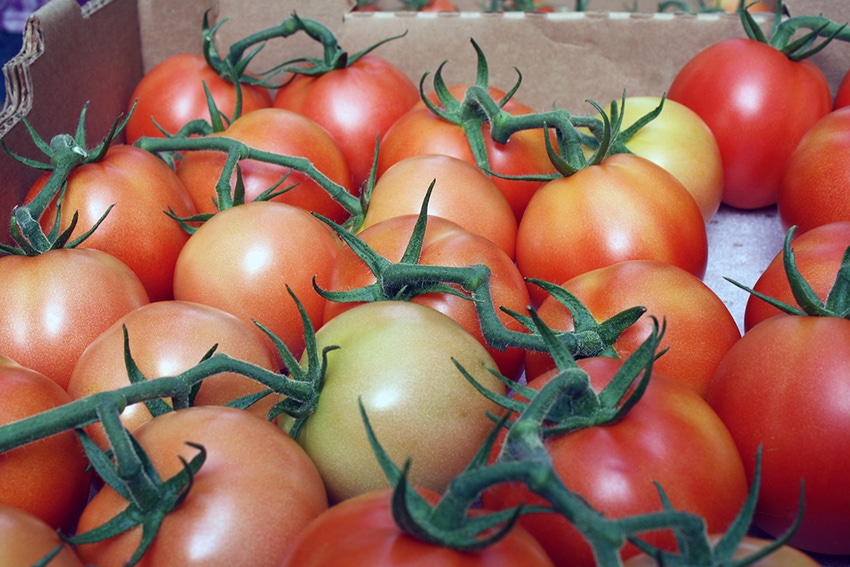
U.S. Department of Commerce on May 7 plans to terminate an agreement between the department and Mexican tomato exporters, which could kindle an antidumping investigation on fresh tomatoes from Mexico.
The U.S. tomato industry has for many years complained that a suspension agreement between the department and Mexico has led to unfair competition and threatened U.S. tomato growers’ businesses.
On Feb. 1, U.S. Senators and House Representatives from 11 states sent a letter urging Commerce Secretary Wilbur Ross to immediately terminate the suspension agreement.
“The U.S. tomato industry has been the canary in the coal mine for domestic fruit and vegetable production over the last three decades. Immediately terminating the suspension agreement will reinvigorate the antidumping investigation on fresh tomatoes from Mexico and send the message that the U.S. will ensure vigilant enforcement of our existing trade laws and trade agreements,” said U.S. Senator Marco Rubio (R-FL), in a Feb. 1 statement about the issue.
The termination of the tomato agreement has been met with resistance by the Border Trade Alliance, which says the decision benefits only a small group of Florida tomato growers.
"The increased protection Florida is pursuing would involve placing high duties on Mexican produce, leading to increased prices, less variety for U.S. consumers, and a distribution monopoly for a few Florida growers, who ironically buy and repack Mexican tomatoes themselves," said BTA President Britton Clarke in an op-ed in the Rio Grande Guardian released by the PRNewswire March 22.
The BTA is a non-profit organization formed in1986 to advocate issues pertaining to border development and quality of life and trade in the Americas, according to its website. The alliance says a renewal of the antidumping investigation into Mexican tomatoes will lead to retaliation by Mexico and threaten pending trade agreements, such as the United States-Mexico-Canada Agreement, or USMCA.
Florida Tomato Exchange says framing the issue as a fight between Florida tomato growers alone and the Mexican tomatoes is misleading.
“The failure of the suspension agreement and the continued dumping of Mexican tomatoes has negatively impacted tomato growers around the country during all growing seasons. That’s why 48 Members of Congress from 11 different states sent a letter to Commerce Secretary Ross in February requesting the termination,” says Michael D. Schadler, deputy manager of the Florida Tomato Exchange in March 26 statement.
Schadler says that a March hearing on the tomato matter before the U.S. International Trade Commission included six U.S. tomato growers with operations in California, Michigan, Tennessee, Georgia, Virginia, and Florida. Only two of those six growers have production in Florida.
He said the suspension agreement wasn’t working, and that is why the DOC terminated it and will restart the antidumping investigation on Mexican tomatoes.
“We remain open to further negotiations for a new suspension agreement, but after the last six years of a failed agreement, the domestic industry can’t afford minor window dressing of the current deal,” Schadler says.
On Feb. 6, the DOC notified the Mexican signatories to the 2013 Suspension Agreement on Fresh Tomatoes from Mexico that the department intended to withdraw from the agreement. “We have heard the concerns of the American tomato producing industry and are taking action today to ensure they are protected from unfair trading practices,” says Secretary of Commerce Wilbur Ross, in a Feb. 6 statement. “The Trump Administration will continue to use every tool in our toolbox to ensure trade is free, fair, and reciprocal.”
Upon completion of the withdrawal, the DOC “will continue with its investigation and notify the International Trade Commission of its final determination. If the Department continues to find sales made at less than fair value in its final determination, the ITC will then complete its own investigation and make a final determination with respect to injury. If both Commerce and the ITC issue affirmative final determinations, an antidumping duty order will be issued,” according to DOC.
On Feb. 25, Mexican tomato growers filed a complaint with the United States Court of International Trade, challenging a DOC’s determination in the 2018 sunset review of the agreement suspending the antidumping investigation on imports of fresh tomatoes from Mexico. The Mexican growers challenge whether DOC had the basis for conducting a review and specific findings DOC made.
Robert LaRussa of Shearman and Sterling represents the Mexican growers and made the following statement at the time:
"Mexican tomato growers have been trying for one year to renegotiate an existing agreement with the Commerce Department that has brought variety, quality and sanity to the U.S. market for fresh tomatoes. That effort has been met by resistance by a small group of growers from Florida who have tried to kill the agreement through a variety of legal maneuvers. Although our first preference is to negotiate, if we must fight this out at the Commerce Department, the International Trade Commission and in the courts to maintain a free and fair vegetable market for U.S. consumers then we will do so, as we did today."
About the Author(s)
You May Also Like






